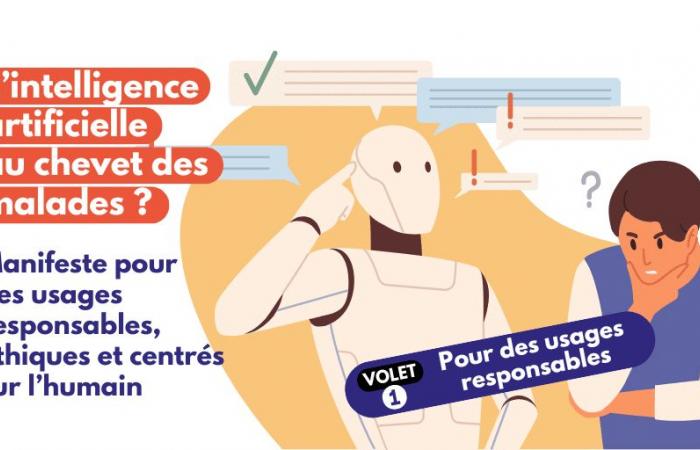Artificial intelligence (AI) is now making a remarkable entry into the world of health. From diagnostic assistance to the organization of care pathways, AI-based tools offer unprecedented promise for improving the precision, efficiency and safety of medical care. But these advances also raise many questions. How can we ensure that these technologies truly serve patients and healthcare professionals, without dehumanizing the care relationship? What transparency can be guaranteed for decisions assisted by algorithms? Who will bear responsibility in the event of an error?
Faced with these crucial issues, France Assos Santé is today publishing the first part of its manifest titled Artificial intelligence in healthcare: for responsible, ethical and human-centered uses. In this first part, we offer an in-depth reflection on the integration of AI into the health system and the issues of responsibility at the heart of practices. Written with the active participation of user representatives, it gives patients and their loved ones a central place in this major transformation of the healthcare system.
This first part is structured around 3 axes, each giving rise to concrete recommendations on the challenges that arise.
- First of these: the need to preserve the medical liability. Health professionals must have the final say in medical decisions. This requires an ambitious effort in terms of formationso that each professional understands the tools they use and the limits of the algorithms that assist them.
- Second issue: the transparency and explainability artificial intelligence systems. Today, these technologies are often perceived as “black boxes”, producing results that are difficult to understand for patients and caregivers alike. The manifesto calls for an effort at education and explanation, in order to restore confidence in these tools and protect shared decision-making in care.
- Third subject: responsibility of designers in the creation of fair, efficient and ethical tools. Algorithmic bias, which can notably arise from unrepresentative data, constitutes a major risk for the equity of care. Companies developing artificial intelligence systems must not only guarantee their reliability, but also commit to a process of continuous vigilance.
Beyond the technical and legal issues, this manifesto defends a profoundly humanist vision of AI in health. “Artificial intelligence must be a lever to improve the quality of care and strengthen human proximity, and not an excuse to dehumanize our health system,” believes Gérard Raymond, president of France Assos Santé. Technological tools will never replace the essential relationship between caregiver and patient, but they can help free up time, improve the accuracy of diagnoses and support a more efficient organization of care.
To accompany this publication, France Assos Santé also offers two additional resources intended to better understand the challenges of AI in health. A educational summaryaccessible to all, explains the major concepts that make up artificial intelligence, to which is added a collection of concrete use cases to illustrate the benefits and limits of the tools already deployed in health pathways.
By publishing this manifesto, France Assos Santé asserts a strong and constructive position. Artificial intelligence should not be seen as a threat, but as an opportunity to think differently about tomorrow’s health. However, this opportunity can only be realized if the voice and vigilance of civil society are taken into account. Indeed, an artificial intelligence that resembles our health system and its values can only be thought of through economic interests or financing the innovation of this technology.
Find it fully manifest on our site and participate in this collective reflection for a future where AI will truly serve patients.






